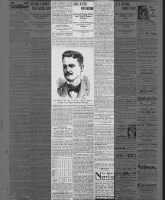SOUR, SELFISH AND NARROW - Attitude of Eastern Wheelmen Toward Western Brethren. - The San Francisco Call, 23 Feb 1897
SOUR, SELFISH AND NARROW
Attitude of Eastern Wheelmen Toward Western Brethren.
Return of R. M. Welch From the National L. A. W. Assembly
What He Thinks and What He Says of the Delegates He Met.
Robert M. Welch, a member of the National racing board of the League of American Wheelmen and one of the delegates from the North California division to the National assembly of the league recently held at Albany, N. Y., returned last evening. He was met at the Sixteenth-street station, Oakland, by a number of his friends prominent in local wheeling interests, and representatives from the different papers.
 |
| R. M. WELCH, Who Has Just Returned From the National Assembly of the League of American Wheelmen. |
As is pretty generally known the purpose of the North California division in sending its delegates East was to secure an amendment to the racing roles providing for divisional option on the question of Sunday racing, that is, that each State should have the right to decide for itself whether or not it would sanction cycle racing on Sunday. This division was entitled to seven delegates, two of whom, Mr. Welch and Judge Frank H. Kerrigan, went in person, carrying the proxies of the other five. In New York City they met Frank W. Fuller, who accepted a proxy, went with them to Albany and materially assisted in the work.
Mr. Welch felt rather tired on his return last night, but said to a CALL reporter that he was glad to be home and among his friends once more, and to have an opportunity to express himself on the L. A. W.
"We went there," he said, "expecting that we were going to at least a quasi-fraternal association, to deal with a lot of fair, generous men. We found then sour, selfish and narrow-minded. We received absolutely no courtesies from any of them, and, accustomed as we were to the warm-hearted hospitality of Californians, the surprise was most complete.
"To show you how little sympathy the L. A. W. has for its racing interests - at the time we were discussing the admission of professionals to membership, which was defeated, by the way, and the argument was made that we controlled them and yet allowed them no representation, the reply was that we did not ask them to come to us, they sought us and asked for our protection. If they don't like what they get, let them get down and out.
"During the argument on Sunday racing one man from Louisiana was telling how badly they needed it there; that meets were only held on Saturdays or holidays and tracks were a financial loss or had to be abandoned entirely. I saw and heard men in that assembly nudge each other and say they were glad to hear it.
"As a matter of course, the L. A. W. does not care a snap for racing. It's hue-and-cry is good roads; and yet that is the biggest farce in the world. There is absolutely no interest in it and the L. A. W. is not creating any. I saw that man Potter presiding at a good roads meeting at Albany and listened to some crank tell how you could put down cloth and lay asphalt or macadam on it and make a splendid road. The good roads banquet was a farce. There was to be a night session of the Good Roads Congress, so the members of the Legislature could attend. Well, I believe there were six people present, newspaper men included. It was an awful fizzle. Nobody of any importance took any notice of it. The league gets its prestige and its name from its racing interests, the very thing those short-sighted Easterners are trying to down.
"Now, the position I take is just this: At present we cannot do much, although Illinois, Missouri, Colorado and all the Western States, save and except that little South California division, are only waiting for us to take the initiative and they will follow. But there must be some organization, some head to it, and who is going to take it? There must be somebody of character and energy to take hold of it. and the trouble is those who have been doing the most talking have no standing.
"What I suggest is that we first wait and see what action the executive committee takes at its meeting in New York to-morrow, Kerrigan is there and will ask them to instruct the racing board not to suspend any riders who race in California on Sunday. If they agree to this our point is partly gained and we can struggle along for a while longer. If not it is time to call a meeting of the local board of officers and discuss what action is to be taken.
"If the racing board gets into shape and a circuit is arranged to start from here, and many Eastern riders come here, perhaps it would be best to wait until they have gone. Our tracks cannot exist as they are, however. They must promote Sunday racing to pay even expenses. If the executive committee permits it all discontent will be allayed and we will have no immediate grievance. Otherwise the tracks will promote it anyway, and there will be plenty of men who will ride. Who of our California boys will go East this year? Probably only four - Ziegler, McFarland, Wells and "Bob" Terrill. Sunday racing for plethoric purses may keep them here to say nothing of attracting the Eastern cracks.

Comments
Post a Comment